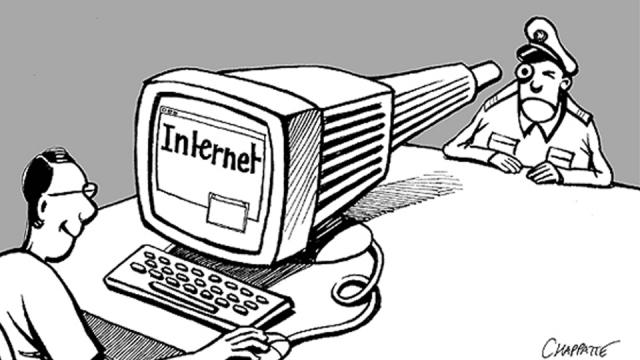Does the internet allow more privacy than a totalitarian regime? In order to tackle this question, let us first consider privacy in a regime such as communist East Germany.
After Hitler was defeated in 1945, Germany was divided into four parts among the allies Britain, France, America and the Soviet Union. This lead to the separation of Germany into east and west. Britain, France and America together formed the democratic Federal Republic of Germany (FRG) in the west and the Soviet Union founded the communist Democratic Republic of Germany (DRG) in the east. The major part of the population of East Germany did not support the communist ideology though and consequently wanted to escape to west Germany (Hopkins, 2017). In order to ensure that the population of East Germany was controlled the Stasi, a secret service and secret police, was created in 1950 (Hignett, 2017). In essence the Stasi was an espionage organization that ruthlessly monitored and controlled the activities of East Germans. The methods used ranged from tapping phones to opening the mail of citizens that were considered to be an opposition to the DRG. The Stasi had up to 91,015 full time employees and a network of 189,000 unofficial collaborators (Bstu.bund.de, 2017). The fall of communism in 1989 lead to the dissolvement of the Stasi in 1990 (Hignett, 2017). To set the magnitude of surveillance into context, 35 million documents, photos, sound documents, and tapes of telephone conversations were released for public viewing after the Stasi was dissolved (Hignett, 2017).
Now let us consider the situation in the internet.
Online presence on social media is obviously important to people. Both, men and women, try to make their physical appearance as nice as possible, display information regarding birth date, relationship status, religion, address and many more. I would even go as far as saying, social media now days consists of platforms that should replace identity and personality. This allows anybody to access basic information about you already. Many users in social media are also not aware of extensive privacy settings to protect themselves. This makes them extremely vulnerable.
Furthermore, simple advertising tools such as cookies which track your online activity, can also be used to expose your personal internet queries. Most people don’t know that cookies should ideally be removed every time you access the internet. Therefore, internet users are vulnerable again. (Roswell, 2017)
It is not hard however for Hackers to get even more information about you. Just recently, credit rating agency Equifax was subject to a major data breach by Hackers that left 145 million Americans exposed. It was the biggest data breach in the history of hacker attacks. Social security numbers, birth dates, telephone numbers and, in some cases, driver’s licence and credit card numbers were stolen from people who willingly provided this is information to the web. This highlights that anybody can steal from you in an internet context. (BBC News, 2017)
This brings us to the following conclusion.
Espionage methods under the Stasi were extensive and thus infiltrated the personal life of the East German population. However, the Internet is different to the extent that it does not monitor and interrogate you to gain information. Instead you as an individual provide the data to the internet which allows third parties, such as Hackers, to get more information about you. Most internet users access the web to find information on anything ranging from a puppy picture to the most intimate search. Google therefore knows the most intimate searches a person would potentially not even tell his wife. In contrast the Stasi had to interrogate individuals to find information that some might not be willing to share. Therefore, privacy in an internet setting is far more exposed than it used to be under the Stasi.
Work Cited
Bstu.bund.de. (2017). BStUÂ -Â What was the Stasi?. [online] Available at: http://www.bstu.bund.de/EN/PublicEducation/SchoolEducation/WhatWasTheStasi/_node.html [Accessed 14 Oct. 2017].
Hopkins, R. (2017). A glimpse of life behind the Berlin Wall. [online] Telegraph.co.uk. Available at: http://www.telegraph.co.uk/expat/expatlife/11570669/A-glimpse-of-life-behind-the-Berlin-Wall.html [Accessed 14 Oct. 2017].
Hignett, K. (2017). ‘Everything about everyone’: the depth of Stasi surveillance in the GDR.. [online] The View East. Available at: https://thevieweast.wordpress.com/2013/07/11/everything-about-everyone-the-depth-of-stasi-surveillance-in-the-gdr/ [Accessed 14 Oct. 2017].
Roswell, C. (2017). How Social Media Sites Invade Your Privacy – The VPN Guru. [online] The VPN Guru. Available at: https://thevpn.guru/how-social-media-invades-privacy/ [Accessed 14 Oct. 2017].
BBC News. (2017). Is privacy dead in an online world?. [online] Available at: http://www.bbc.com/news/technology-41483723 [Accessed 14 Oct. 2017].

